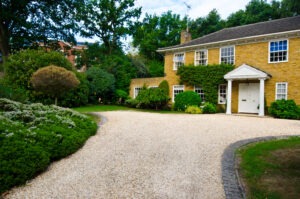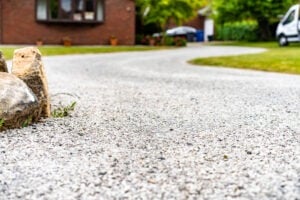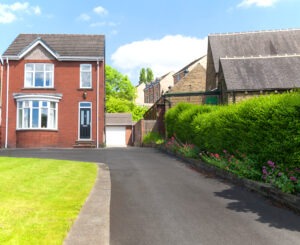- Home
- About Us
- Member Profiles
- Help and Advice
arrow_drop_down
- Conciliation
arrow_drop_down
- Guild magazine
Driveway cost
 A pot-holed, cracked and worn driveway not only risks damaging your car every time you leave or return to your home, but it also looks unsightly, which can seriously undermine a property’s kerbside appeal. It’s estimated that a new driveway can add up to 10 per cent to a home’s value, so the investment should pay dividends if you are planning to sell some time soon.
A pot-holed, cracked and worn driveway not only risks damaging your car every time you leave or return to your home, but it also looks unsightly, which can seriously undermine a property’s kerbside appeal. It’s estimated that a new driveway can add up to 10 per cent to a home’s value, so the investment should pay dividends if you are planning to sell some time soon.
Whether you are looking to replace or revamp a driveway, or start entirely from scratch, there are several key considerations to factor in, such as cost, materials to use and extra undertakings that may need to be actioned, including correct drainage and in some cases, planning permission.
In this blog, we will dig down into examples of driveway cost among other topics, and why employing experts could be the safest route to take. Even the most confident DIY-er might come unstuck with a project on this scale, and an expert will have the bonus of being able to advise on any local legislation that needs to be met. Hiring professional and skilled tradespeople is easy at Find a Craftsman. One simple click here gives you access to a choice of driveway specialists, amongst many other tradespeople local to you.
How much does a new driveway cost?
The majority of the cost is made up of what’s going on beneath the surface. Around 80 per cent of the financial outlay covers the sub-base and ground preparation, with the remaining 20 per cent on the materials to create the desired finish. In general, £60–£120 per m2 is a good starting point if extensive groundwork is required, and you should allow 14.4m2 for a single car parking space or 23m2 for a double car parking space. Removal of an old driveway can run into several hundred pounds, depending on the size and skip hire is around £200 on top. In the table below we list some examples of material prices. This does not include installation costs.
Driveway material | Average price per m2 |
Gravel | £40–£100 |
Concrete | £65–£100 |
Resin | £65–£100 |
Tarmac | £55–£65 |
Cement | £85–£110 (per m3) |
Asphalt | £50–£80 |
Block paving | £85–£170 |
*Homeownercosts.co.uk, 2022
Other factors that will affect your choice of material include:
- Whether there are slopes.
- The space available.
- Type of soil underneath.
- Whether surface water is an issue for you.
- Whether there are existing drainage issues.
 Cost versus benefit of different driveway materials
Cost versus benefit of different driveway materials
As the information above highlights, gravel and tarmac are likely to be the more budget-friendly options, when compared to block paving, for example. Now we’ll look at some of these in closer detail and discuss the benefits of choosing them.
Concrete driveway cost
An average two-car concrete driveway can cost around £1,500–£3,000** to install. The curing process – when it can take the weight of a car – can take 28 days, so it might not be the best option if you’re in hurry. The advantages of concrete include:
- Extremely hard-wearing, low maintenance and easy to repair.
- A lifespan of approximately 50 years.
- Suitable for steep gradients, with the option to have a stamped or patterned design.
However, concrete is a relatively expensive option and if it is not correctly installed (especially on steep gradients), it can be liable to crack. Its non-porous surface requires suitable drainage to cope with flood water.
 Resin driveway cost
Resin driveway cost
A 30m2 driveway will come in at between £1,500–£2,400**. Installation time can be between two and seven days, with an extra one/two days for curing. The advantages of resin include:
- A great choice for sloped driveways, resin is extremely porous and has good grip in the icy winter months.
- Gives a ‘gravel’ look without the issue of scattering.
- Can be customised with a variety of colours.
While resin is fairly low maintenance, it can be prone to moss growth and cracking, the latter at around the 20-year mark.
Gravel driveway cost
With price tag of between £1,200–£2,400** for a 30m2 driveway, installation time can be quick – two days – if no major groundwork is required. The advantages of gravel include:
- Environmentally friendly and highly permeable.
- Looks smart and is a cost-effective for larger areas.
- Stands up to winter weather well.
A drawback with gravel is its tendency to ‘pile up’ and move off the driveway, making it unsuitable for steep gradients. Gravel mats and driveway skirting can help minimise scattering, but you will need to maintain it pretty regularly and it is also a noisier option than others.
 Block paving driveway cost
Block paving driveway cost
Coming in at between £2,100–£3,000** for a 30m2 driveway, block or brickwork driveways are a classic choice but can take up to a week for one/two skilled tradespeople to install. The advantages of block paving include:
- Simple to install, with minimum noise disruption.
- Higher eco-friendly credentials when compared to tarmac, for example.
- Permeable and drainage ready.
Block paving can be customised with many creative design features to give a unique look to your driveway, but you’ll have to regularly weed to keep it looking smart. This material is also prone to cracking.
Will I need planning permission?
If you use a permeable (porous) material, such as gravel, or if water is directed away via an adequate drainage system, this added step is removed. But non-porous driveways (not often installed) without correct drainage or those over 5m2 will require planning permission. Find out more here: gov.uk/planning-permission-england-wales or ask your Find a Craftsman tradesperson during their first visit.
How much does it cost to repair a driveway?
Budget constrictions might mean an interim repair job is your current option and small holes and cracks can be easily tackled yourself. For example, concrete crack filler can be used to fix pockets that are less than around 6mm for a minimum cost. For asphalt, The table below outlines further repair costs.
Type of driveway | Problem/Repair |
Gravel | Potholes may develop, with a risk of damage to your car. Levelling the surface and adding new gravel is recommended – hiring a tradesperson will cost around £150–£200 a day. |
Resin | A specialist can repair any cracked/ damaged part of the driveway. Price will be dependent on the area size. |
Block paving | Over time, blocks or bricks can become loose. Repointing is required – removing the old mortar with a knife and replacing it with new. Paving mortar can be purchased for around £20–£30 a tub. |
Cost to resurface asphalt driveway
Without proper maintenance, the oils present in asphalt will dry out and oxidise. The typical lifespan of this type of driveway is around 15–20 years so it’s recommended you resurface it once every three years. This can cost around £3,000 for an average-sized driveway, to it may be worth plumping for another driveway material.
Next Steps
We hope you’ve now got a clearer picture of the associated costs of installing a new driveway or repairing an existing one so you can weigh up the financial outlay against the benefits. As the UK’s most established trade association, The Guild of Master Craftsmen has been proudly representing tradespeople and artisans who have skill, integrity and expertise for over 40 years. So, you’re just one click away from finding hundreds of reliable, trustworthy and experienced contractors at Find a Craftsman, conveniently located all over the UK. Simply select two or three tradespeople, compare quotes, experience and testimonials, and your driveway will be an attractive and practical feature of your property once more.
**Price does not include ground preparation etc

